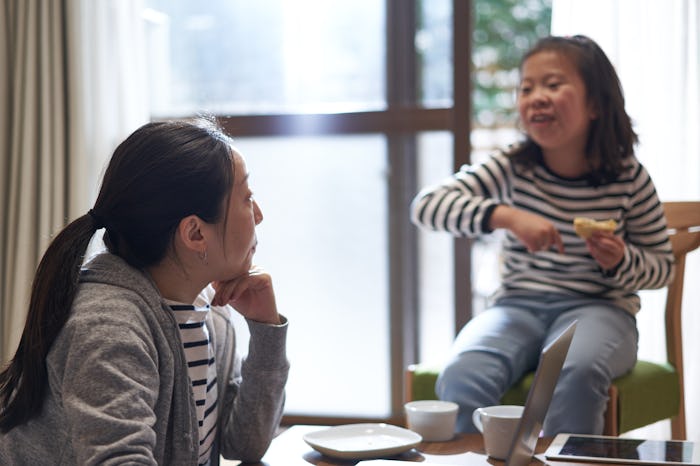Life

How To Answer Your Child’s Questions & Acknowledge Their Fear Of Coronavirus
From shuttered day cares to canceled proms and graduations, kids of all ages are feeling the impact of social distancing thanks to COVID-19. With the virus constantly in the news and daily routines all messed up, how can parents talk to their kids about coronavirus without feeding into their fears? What’s bothering your child depends on their age, but the solutions are simple.
Dan Marullo, clinical psychologist at Children’s of Alabama, tells Romper in an interview that parents can watch for specific signs their child is stressed out or scared. This can mean sleeping too much or too little, trouble with appetite, or unusual grumpiness.
“Any change in behavior can be a sign, so a child that’s pretty happy-go-lucky is now very fearful or showing more irritability, maybe getting frustrated more easily than is typical,” he says. “With younger kids, parents can sometimes tune in to their play or artwork, which might reflect some distress and give some clues. If their play is showing a lot of trauma content to it, that can be a sign as well.”
What exactly about COVID-19 is causing anxiety for your child depends on their age. Littles might just sense extra tension from their parents, while high schoolers might be too in tune with Twitter or freaked out by the news. Kelly Banneyer, pediatric psychologist at Texas Children’s Hospital, tells Romper in an interview that parents can address their child’s fears by first asking what they know.
“A parent could start with a general open-ended question, such as, ‘Do you know why we are all staying home right now?’ for a preschooler, ‘Do you know why you’re talking to your teachers on the computer instead of going to school?’ for school-age kids, or, ‘What do you know about COVID-19?’ for adolescents.”
Once you’ve provided your kiddo with answers, they may follow up with more questions. Just provide the most age-appropriate info you can — no more, no less.
“Parents should correct any misinformation their children have and try to stick to small amounts of factual information. If a parent spends a large amount of time speaking about COVID-19, it sends the message that this is a big deal and their children need to be worried about the situation,” says Banneyer. “If children ask worry questions, such as, ‘Am I going to get it?’ or, ‘Is Grandma going to die?’, parents can give a brief reassuring statement such as, ‘We are doing everything we need to do right now to stay healthy,’ or, ‘Grandma is doing fine.’”
Marullo adds that the same age-appropriateness rule goes for making sure the information they get elsewhere, like from the news, is right for their age. Too much info they can’t understand just adds uncertainty.
“In early school age, they may be overhearing conversations older siblings and parents are having, but they don’t have the capacity to fully understand all of that, so monitor what information they’re getting. They don’t need to be tuning into 24-hour news programs all day,” he says. “Teens can have the knowledge without having all the coping skills yet. Monitor them and redirect them away from constant information. With older teens in particular, maybe send them to reliable sites like the CDC and NIH.”
Experts agree that preventing stress is the first step to keeping your kids’ fears at bay. Karla K. Repper, child and adolescent clinical psychologist at Baptist Behavioral Health, tells Romper in an interview that how adults react tells kids whether current events are scary or not. A lack of routine can make them feel less secure, too.
“Children will notice how you respond to the stories on TV and online, and this will often cue their emotional response. Make sure you’re filtering information on current events, modeling hopeful coping skills, and providing reassurance,” she says. “Children usually fare better when they have a schedule, even if it is a bit looser given all the demands on parents right now. Knowing they need to go to sleep and wake up around the same time, work on schoolwork during the day, play outside, or engage in creative play indoors if it’s not possible to be outside, is ‘scaffolding’ for mood and reduces anxiety.”
Marullo wants to reassure families that a child showing some distress right now is normal.
“If you see some mild to moderate behavior changes, it’s not pathology,” he says. “It’s most likely just a normal reaction to what’s going on. Just maintain your structure and they’ll be OK, but if you do become concerned, seek out your resources. Call your pediatrician for guidance. But most kids are going to do fine with this.”
Experts:
Dan Marullo, PhD, clinical psychologist at Children’s of Alabama
Kelly Banneyer, PhD, pediatric psychologist at Texas Children’s Hospital
Karla K. Repper, PhD, child and adolescent clinical psychologist at Baptist Behavioral Health